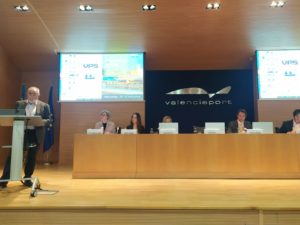
The Director General of Valenciaport, Francesc Sánchez, inaugurated the Ship Energy Summit 2022.
The head of the PAV points out that “the Port of Valencia is firmly committed to being a zero-emissions site by 2030”.
Sánchez indicates that the electrical substation “will allow us to have enough power to be able to supply energy both to automated terminals and to the ships berthing at our docks”.
The general manager of the Port Authority of Valencia (PAV), Francesc Sánchez, has stressed that “the ultimate goal of the port system is decarbonisation and one of the key factors to achieve this is the use of renewable energies, not based on fossil fuels, and to provide the entire logistics chain, including ships, with these energy sources. At the Port of Valencia we are making firm progress in this direction with different projects that are underway”.
Francesc Sánchez inaugurated the Ship Energy Summit 2022 being held in Valencia where he pointed out that “two of the great challenges of the sector are that the fuels used by ships on their routes should be zero emissions, and from the point of view of the ports, as well as supplying renewable energies to the installations, to provide ships with electrical energy, for which significant investments must be made”. In this sense, the general manager of the PAV recalled that “work has already begun on the substation, which will allow us to have enough power to be able to supply both automated terminals and the ships that dock at our quays”.
Valenciaport is currently hosting the Ship Energy Summit 2022 conference on energy transition and the decarbonisation of international shipping. An event that brings together more than 30 experts from the energy and port sectors to address new developments and the development of innovative proposals in the field of sustainability and the fight against climate change. The meeting is addressing the options in terms of fuels and technologies that will enable maritime transport to achieve the greenhouse gas emission reduction targets set by the International Maritime Organisation, a United Nations body, for 2030 and 2050. Topics being addressed include the use of alternative fuels such as hydrogen, ammonia, biofuels or methanol; the regulatory landscape towards the decarbonisation of the sector, emissions rights and business and intersectoral collaboration for the acceleration of projects; electrification in the port environment and the supply of energy on land for ships at berth; and the development of innovation in areas such as ship motorisation, energy storage systems or wind technology.
The general manager of Valenciaport stressed the importance of the port system in this commitment to the European Green Pact “as 80% of the world’s goods are moved by ships”. The Port of Valencia is firmly committed to being a zero emissions site by 2030. To achieve this objective, it is working on a Plan that includes a series of projects related to the generation of energy from renewable sources for self-consumption, the updating of the port’s internal energy distribution networks to be able to supply energy to ships when they are berthed, the promotion of the use of cleaner fuels and the digitalisation and use of management tools based on digital twins that will allow us, through AI and machine learning, to adapt the energy consumption curve to the generation potential at any given moment”.
The Port of Valencia, as a benchmark in environmental initiatives, is the perfect place to host the Ship Energy Summit, “an opportunity to publicise these programmes and establish contacts between the agents involved to collaborate and implement all these initiatives”, said Francesc Sánchez.
Lesley Bankes-Hughes, Executive Editor of Petrospot, organiser of the event, indicated that Valencia has been chosen because “there is a lot of innovation, creativity and progress in the Spanish ports and in the Mediterranean region. Ports such as Valencia will be fundamental in creating infrastructures that supply clean fuels and can become a hub for future energies to be applied in the domestic economy”.

